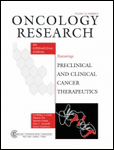
ONCOLOGY RESEARCH
Scope & Guideline
Fostering Excellence in Oncology Research and Practice
Introduction
Aims and Scopes
- Molecular Oncology:
Investigating the molecular mechanisms underlying cancer development, progression, and metastasis, including studies on oncogenes, tumor suppressor genes, and signaling pathways. - Cancer Therapeutics:
Exploring novel therapeutic strategies for cancer treatment, including drug discovery, combination therapies, immunotherapy, and targeted therapies. - Biomarkers and Diagnostics:
Identifying and validating biomarkers for cancer diagnosis, prognosis, and treatment response, with a focus on non-invasive methods such as liquid biopsies and imaging techniques. - Tumor Microenvironment:
Studying the interactions between cancer cells and their microenvironment, including the roles of immune cells, stromal cells, and extracellular matrix components in tumor progression. - Translational Research:
Facilitating the translation of basic research findings into clinical applications, including clinical trials, patient stratification, and personalized medicine approaches. - Cancer Epidemiology and Prevention:
Examining factors influencing cancer incidence, survival, and outcomes, including genetic, environmental, and lifestyle factors.
Trending and Emerging
- Long Non-Coding RNAs (lncRNAs):
Research on lncRNAs has gained momentum, highlighting their roles in cancer biology as regulators of gene expression and potential therapeutic targets. - MicroRNA Therapeutics:
The exploration of microRNAs as both biomarkers and therapeutic agents has become a prominent theme, emphasizing their regulatory roles in cancer progression and treatment response. - Immune Checkpoint Inhibition:
Studies focusing on immune checkpoint inhibitors and their mechanisms of action have surged, reflecting the growing importance of immunotherapy in cancer treatment. - Personalized Medicine:
There is a strong trend towards personalized medicine, with an emphasis on tailoring treatments based on individual genetic profiles and tumor characteristics. - Nanomedicine and Drug Delivery Systems:
Innovative approaches utilizing nanotechnology for targeted drug delivery and enhanced therapeutic efficacy are emerging as a significant area of research. - Metabolomics and Cancer Metabolism:
Research into cancer metabolism and the role of metabolites in tumor biology is gaining traction, contributing to the understanding of tumor growth and resistance mechanisms.
Declining or Waning
- Conventional Chemotherapy Studies:
Research focused on traditional chemotherapy regimens has decreased, likely due to the emergence of targeted therapies and immunotherapies that offer improved efficacy and safety profiles. - Single-Agent Treatments:
There has been a waning interest in studies that evaluate single-agent treatments without the context of combination therapies, reflecting a shift towards more comprehensive treatment approaches. - Basic Cell Line Studies:
The reliance on basic in vitro studies using established cancer cell lines without further validation in preclinical models or clinical settings has seen a decline, indicating a need for more translational relevance. - Animal Models of Cancer:
Research utilizing traditional animal models may be declining in favor of more sophisticated in vivo systems, such as patient-derived xenografts or organoids, which better mimic human tumor biology. - Epidemiological Studies in Rare Cancers:
The frequency of epidemiological studies focusing on rare cancer types may be diminishing, possibly due to limited funding and research interest compared to more prevalent cancers.
Similar Journals

Translational Oncology
Transforming Cancer Insights into Clinical SolutionsTranslational Oncology is a premier open access journal published by Elsevier Science Inc, dedicated to the rapidly evolving field of cancer research and oncology. Since its inception in 2008, the journal has been a vital platform for the dissemination of innovative research and findings that bridge the gap between laboratory discoveries and clinical applications. With an impressive impact factor and ranked Q2 in Cancer Research and Q1 in Oncology, it occupies a prominent position in the academic landscape, helping to shape the future of cancer therapeutics and patient care. The journal offers valuable insights across a diverse array of topics, including molecular biology, genetic factors in cancer, and innovative treatment strategies, ensuring relevance and engagement for its readership. As it converges toward 2024, Translational Oncology continues to attract a global audience of researchers, healthcare professionals, and students committed to advancing our understanding of cancer and enhancing clinical outcomes.
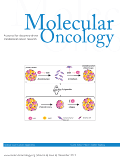
Molecular Oncology
Fostering Excellence in Molecular Oncology Studies.Molecular Oncology, published by WILEY, is a premier open-access journal that has been at the forefront of cancer research since its inception in 2007. With an impressive impact factor reflective of its outstanding contribution to the field, it holds a prestigious position in the Q1 category across multiple disciplines, including Cancer Research, Genetics, and Molecular Medicine. This journal is essential for researchers and professionals seeking to publish high-quality findings in a rapidly evolving area of study, underscored by its significant Scopus rankings that place it within the top percentiles of Oncology and Molecular Biology. As an open-access journal since 2017, it ensures that vital research is readily available to a global audience, thereby facilitating collaboration and knowledge dissemination among academic and clinical communities. With its commitment to innovative and impactful research, Molecular Oncology continues to be a critical resource for advancing our understanding of cancer biology and treatment.

BRITISH JOURNAL OF CANCER
Leading the Charge in Cancer Research Excellence.The British Journal of Cancer, published by SpringerNature, stands as a preeminent resource in the fields of Cancer Research and Oncology, with a distinguished history of publication dating back to 1947. With its Q1 rank in both categories for 2023, this journal is among the top-tier publications, offering cutting-edge research and insights into the biology, etiology, and treatment of cancer. The journal’s rigorous peer-review process ensures that readers are presented with high-quality studies that contribute to the advancement of cancer knowledge and clinical practice. Operating from the United Kingdom, it has garnered a notable impact factor and ranks impressively within Scopus, making it an essential publication for researchers, healthcare professionals, and students who are dedicated to understanding cancer's complexities. Access to the journal's articles is available in traditional formats, providing a versatile platform for disseminating pivotal research. As we move towards a future where cancer treatment and prevention remain crucial, the British Journal of Cancer continues to play a vital role in shaping the dialogue and discoveries within the oncology community.
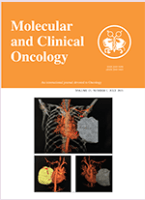
Molecular and Clinical Oncology
Uncovering the molecular secrets of oncology.Molecular and Clinical Oncology is a dynamic journal published by SPANDIDOS PUBL LTD, aimed at advancing the understanding of cancer biology and treatment modalities. With an ISSN of 2049-9450 and an E-ISSN of 2049-9469, the journal serves as a critical platform for researchers and clinicians dedicated to uncovering novel insights in molecular oncology and enhancing clinical practices. As a testament to its growing influence, the journal has achieved a Q3 ranking in Oncology and a Q4 ranking in Cancer Research for the year 2023, reflecting its commitment to publishing high-quality research. Although currently not an Open Access publication, the journal offers crucial subscription options, ensuring comprehensive access to groundbreaking studies and innovations in the field. With converged years spanning 2018 to 2024, the journal is set to continue enriching the academic community with its valuable contributions, ultimately empowering researchers, professionals, and students engaged in the fight against cancer.

CANCER CELL
Your Essential Resource for Cutting-Edge Cancer StudiesCancer Cell, published by Cell Press, represents a pinnacle of research in the fields of cancer research, cell biology, and oncology. With an impressive Impact Factor and ranking as Q1 in prestigious categories for both 2023 and previous years, this journal stands out as a vital resource for professionals and scholars dedicated to understanding the molecular underpinnings of cancer. Operating from Cambridge, MA, Cancer Cell has been an essential platform for innovative studies since its inception in 2002. Although it is not an Open Access journal, its rigorous peer-review process ensures that only the highest quality research is disseminated to the scientific community. Readers can expect to find a wealth of knowledge ranging from cutting-edge therapies to insights into tumor biology, thereby contributing significantly to the advancement of oncology. With rankings placing it among the top echelons of related fields—#2 in Cancer Research and #6 in Oncology—Cancer Cell is an indispensable reference for anyone committed to the fight against cancer.
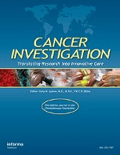
CANCER INVESTIGATION
Unraveling the complexities of cancer through rigorous inquiry.CANCER INVESTIGATION is a distinguished peer-reviewed journal published by Taylor & Francis Inc, dedicated to the advancing field of cancer research and oncology. With an ISSN of 0735-7907 and E-ISSN of 1532-4192, this journal has been a pivotal resource for professionals and researchers since its inception in 1983, continually contributing to the evolving landscape of cancer investigation until its convergence in 2024. CANCER INVESTIGATION boasts noteworthy rankings in 2023, including Q3 in Cancer Research and Q2 in Medicine (miscellaneous), highlighting its relevance and impact in these critical areas. The journal's commitment to disseminating innovative research and comprehensive reviews makes it an essential platform for those engaged in cancer studies and related disciplines. While currently not available as an open-access publication, CANCER INVESTIGATION remains an invaluable tool for understanding the complexities of cancer, offering insights that drive scientific advancements and improve patient outcomes.
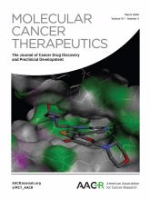
MOLECULAR CANCER THERAPEUTICS
Empowering breakthroughs in cancer research and treatment.MOLECULAR CANCER THERAPEUTICS, published by the American Association for Cancer Research, is a premier journal dedicated to advancing the field of cancer research and therapy since 2001. With a notable impact factor reflecting its high-quality content, this journal stands out in the Q1 category for both Cancer Research and Oncology as of 2023. Researchers, clinicians, and students interested in innovative treatment strategies and molecular mechanisms can find valuable insights within its pages, bolstered by a rigorous peer-review process and a global perspective on cancer therapeutic developments. Although the journal operates under a subscription model, it provides comprehensive access to cutting-edge studies and reviews that drive forward the understanding of cancer biology and treatment modalities. The journal's impressive Scopus rankings further validate its influence within both oncology and the broader cancer research community, making it an indispensable resource for anyone committed to combating cancer through science.

CANCER IMMUNOLOGY IMMUNOTHERAPY
Transforming Insights into Effective Cancer TreatmentsCancer Immunology Immunotherapy, published by Springer, stands as a premier journal in the fields of cancer research and immunology, holding a prestigious Q1 ranking across multiple categories, including Oncology and Medicine as of 2023. With an ISSN of 0340-7004 and an E-ISSN of 1432-0851, this journal has been a pivotal platform for groundbreaking research since its inception in 1976, continuing to provide insight into the complex interactions between the immune system and cancer. The journal's scope encompasses a wide array of topics, including novel therapeutic strategies, immunological mechanisms, and translational science aimed at advancing treatment outcomes for cancer patients. Renowned for its rigorous peer-review process and high impact factor, it attracts contributions from leading experts and researchers around the globe, positioning itself among the top-tier publications with Scopus rankings that reflect its vital role in advancing the field. Access options are generally subscription-based, ensuring a comprehensive resource for professionals and academics seeking to deepen their understanding and make meaningful contributions to cancer immunotherapy.

CANCER AND METASTASIS REVIEWS
Pioneering Discoveries in Cancer and MetastasisCancer and Metastasis Reviews, published by Springer, is a leading journal in the field of oncology and cancer research. With an impressive impact factor placing it in the Q1 category for both Cancer Research and Oncology as of 2023, this journal is ranked 29th out of 404 in Medicine, Oncology, and 22nd out of 230 in Biochemistry, Genetics, and Molecular Biology, reflecting its significant influence and prestige in the academic community. Established in 1982, the journal covers a wide spectrum of topics related to the mechanisms of cancer progression and metastasis, making it an essential resource for researchers, healthcare professionals, and students dedicated to understanding and tackling cancer. Although the journal does not provide open access options, the impactful research it publishes contributes to advances in therapeutic strategies and enhances the collective knowledge surrounding cancer pathophysiology. With research converging from 1982 to 2024, Cancer and Metastasis Reviews continues to be a vital platform for disseminating high-quality scientific information in the ever-evolving landscape of cancer research.

Cancer Communications
Connecting Researchers, Practitioners, and Patients in OncologyCancer Communications, published by WILEY, is a leading open-access journal that has positioned itself at the forefront of cancer research and oncology since its inception in 2017. With an impressive HIndex reflective of its scholarly impact and recognized in the Q1 category for both Cancer Research and Oncology as of 2023, this journal consistently ranks in the top echelons of its field, specifically at Rank #16/404 and Rank #13/230 in their respective categories on Scopus. Cancer Communications aims to disseminate cutting-edge research findings, innovative methodologies, and significant advancements in cancer treatments, thereby fostering a deeper understanding of oncology among researchers, healthcare professionals, and students. The journal operates under an Open Access model since 2018, ensuring that vital research is accessible to a global audience, thus enhancing collaboration and knowledge sharing necessary to tackle one of the most pressing health challenges of our time. Located in Hoboken, NJ, United States, and with a strong commitment to scientific excellence, Cancer Communications remains an essential resource for anyone engaged in the fight against cancer.